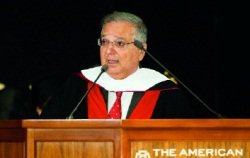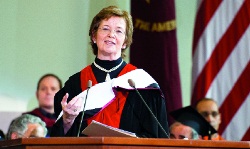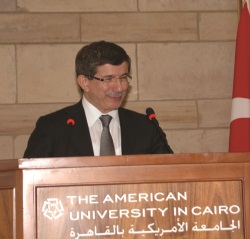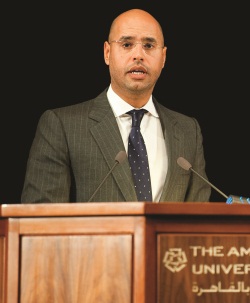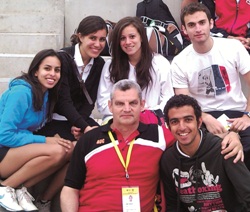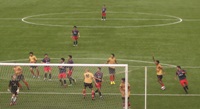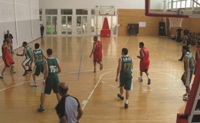First Visually Impaired Student Graduates, Former For the first time in its history, AUC presented the master’s degree in teaching English as a foreign language to a visually impaired student Salama Ali, whose speech at the Spring 2010 graduate commencement earned a standing ovation. In addressing his fellow graduates, Ali noted his challenges and also thanked the university for its assistance. “I indeed worked very hard to get my MA and faced lots of obstacles, but thanks to the unique education offered here at AUC, I was trained to view these obstacles as opportunities to improve,” he said. Graduate commencement speaker and honorary degree recipient Gabriel Hawawini, The Henry Grunfeld Chaired Professor of Investment Banking at INSEAD and visiting scholar at the Wharton School, advised graduates to avoid the “ignorance-arrogance trap,” which he believed caused the global financial crisis. “Don’t underestimate history, and don’t become overconfident,” he said, addressing the graduates. “Use the knowledge and education you have received at AUC to avoid the ignorance of the clever and At the undergraduate ceremony, Mary Robinson, former president of Ireland, delivered the commencement address and received an honorary doctorate in recognition of her international political career and support of human rights. In her speech, Robinson urged the graduating class to work on human rights issues. “I am talking to you graduates on such issues because your future is before you,” she said. “I hope that you will carry my passion for the true values of human rights. If you care, you can change many circumstances.” At both ceremonies, distinguished faculty members were awarded for their excellence in a number of areas. The Excellence in Research and Creative Endeavors Award was given to Amal Esawi, associate professor of mechanical engineering; John Baboukis, director of the music program; and Amr Shaarawi, physics professor and associate dean of graduate studies and research at the School of Sciences and Engineering. In addition, Ahmed Tolba, assistant professor of management, received the Excellent Teacher of the Year Award, and Nagwa Kassabgy, English language teacher, was granted the Excellent Instructor of the Year Award. |
||||||
Alumni Share Ideas and Experiences at TEDx Cairo Held at Ewart Hall, the recent TEDx event in Egypt featured several AUC alumni as speakers. Established in California 25 years ago, the annual TEDx conference invites the world’s thinkers to speak for 18 minutes to share “ideas worth spreading” on topics related to Technology, Entertainment and Design (TED). Previous speakers have included Bill Gates, Al Gore, Elizabeth Gilbert and former U.K. Prime Minister Gordon Brown. Omar Samra ’00, the first Egyptian to climb Mount Everest, shared his experience. He described how he remained persistent in overcoming all challenges to achieve his goal. “One should never stop at achieving one’s goal,” Samra noted. “There is always the question of what happens after it?” The key, he explained, is to love what you do to be able to excel at it. “You will never be distinguished and unique unless you do it with passion and your heart is in it.” Rana El Kaliouby ’98, ’00, who is currently a research scientist at MIT Media Laboratory and also supervises AUC undergraduate and graduate theses in computer science and engineering, was also among the panelists. El Kaliouby spoke about developing technology to help people with developmental problems connect and communicate in better ways. She also addressed the importance of fighting stereotypes. “If you meet me in a club with kids and a veil, you would not think I am a researcher at MIT, and this is because people get stuck with stereotypes,” explained El Kaliouby, who got a standing ovation. “As an implicit takeaway, you can be an Egyptian, a Muslim, a woman, a mom and make things happen.” Other AUC alumni in the panel included Egyptian filmmaker Ibrahim El Battout ’85 and renowned actor Khaled Aboul Naga ’89. |
||||||
AUC Hosts Global Walk Against Hunger Continuing its tradition to support humanitarian causes, AUC hosted the eighth annual United Nations World Food Programme event, Walk the World, around its New Cairo campus (See back cover). The symbolic walk is an effort to raise money and awareness of the World Food Programme’s global fight against hunger and malnutrition, especially for children. Hundreds of thousands of individuals in more than 80 countries in 24 time zones joined together in this event in order to take on one of the most vital global challenges of our era. In addition to hosting the event, AUC has also partnered with the United Nations World Food Programme to form a student club, Bite for Life, through which students in the economics department will assist with the execution of the Food for Education Program in Egypt. In previous years, the walk has taken place at such Egyptian landmarks as the Pyramids of Giza, Mount Saint Catherine, Cairo Citadel and Al Azhar Park. Last year’s walk featured 360,000 people globally in 210 locations. The money raised was enough to provide school meals to more than 20,000 children for one year.
|
||||||
Turkish Foreign Minister Speaks at AUC Delivering the inaugural lecture of the public policy series held by AUC’s School of Global Affairs and Public Policy, Ahmet Davuto glu, foreign affairs minister of the Republic of Turkey, focused on how his country has undergone a transformation in the post-Cold War era. In his lecture titled “Turkish Policies and Peace in the Middle East,” Davuto glu discussed how Turkey has been able to preserve a balance between security and freedom, establish better relationships with its border neighbors, engage in proactive diplomacy, become more active in international politics and build complementary relationships with other nations. In citing these accomplishments, he hoped to bring a new political approach to the Middle East that is vision-oriented as opposed to crisis-oriented. “We must act before crises emerge. We will not simply react to crises,” he noted. |
||||||
Saif Al-Islam Alqadhafi Discusses Libyan Reform Saif Al-Islam Alqadhafi, president of Alqadhafi International Foundation for Charity and Development, discussed the ways in which Libya is undergoing reform to become a more free and democratic society. In his lecture, “The Past, Present and Future of Libya,” Alqadhafi explained that Libya is not known for its strong civil society organizations or democratic institutions. This legacy, he insisted, is not due to Islam or the influence of Arab culture, but rather is an effect of colonialism. His vision for democracy in the Middle East is for countries to move away from authoritarian security structures and reliance on oil wealth to bolster economies, allowing people to let go of their distrust of central administration. “The challenge is to move from a militant society to a free society, from an artificial economy to a real one,” he said. His aim for Libya is to blend deliberative, direct and representative democracy in a way that maximizes the voice of the people. He cited a lack of independent media and civil society organizations, as well as non-engagement with political dissidents, as part of the problem. | ||||||
AUC Wins First Place in International Sports Tournament in Beirut AUC won first place in the first International University Sports Tournament held at the American University of Beirut (AUB). Through the four-day tournament, teams from 11 American universities around the world competed in basketball, volleyball, soccer, swimming and tennis. Second place went to host university AUB, while the Jordanian University of Science and Technology ranked third. Seventy student athletes and six coaches represented AUC, which participated in all of the tournament events. AUC dominated all individual sports in the tournament. It won 37 medals including 23 gold, eight silver and six bronze. Swimming and tennis were the university’s leading sports in topmedal finishes. AUC teams also did well in other sports such as women’s volleyball, which won first place, scoring 3-0 shutouts in all matches. Other teams also had high scores including the women’s basketball team, which came in third place. AUC men’s football and basketball teams ranked fourth among eight participating teams.
“This was a difficult tournament, with very strong teams from other schools,” said Charles Gordon, director of athletics at AUC. “Although the swimming competition was very challenging, the swim team did an exceptional job by winning 19 gold, seven silver and four bronze medals.” |
||||||
AUC’s Economic and Business History Research Center (EBHRC) hosted its seventh annual forum on the economic and business history of Egypt and the Middle East. The forum aims to spread awareness of the center’s compiled records that relate to the history of public policy and business enterprise in Egypt and the Middle East, as well as to engage international scholars, students and business leaders in this documentation and archival work. This year, the EBHRC partnered with the Supreme Council of Culture, the National Center for Translation, Partners in Development and the university’s Middle East Studies Center. “The involvement of outside partners has certainly helped us attract the local academic and intellectual community for whom the forum creates an opportunity to share and discuss research with international scholars,” explained Randa Kaldas, associate director of EBHRC. |
||||||
